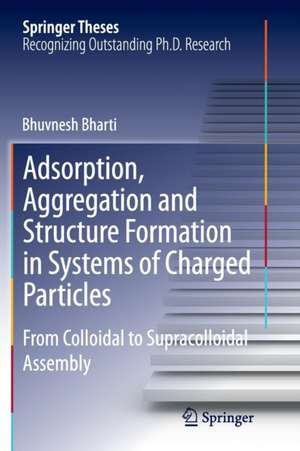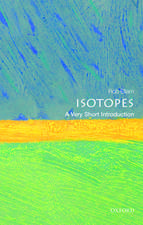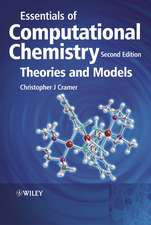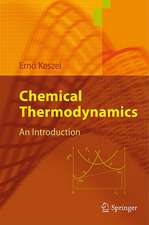Adsorption, Aggregation and Structure Formation in Systems of Charged Particles: From Colloidal to Supracolloidal Assembly: Springer Theses
Autor Bhuvnesh Bhartien Limba Engleză Paperback – 10 sep 2016
| Toate formatele și edițiile | Preț | Express |
|---|---|---|
| Paperback (1) | 634.18 lei 6-8 săpt. | |
| Springer International Publishing – 10 sep 2016 | 634.18 lei 6-8 săpt. | |
| Hardback (1) | 640.24 lei 6-8 săpt. | |
| Springer International Publishing – iul 2014 | 640.24 lei 6-8 săpt. |
Din seria Springer Theses
- 5%
 Preț: 1154.07 lei
Preț: 1154.07 lei -
 Preț: 389.88 lei
Preț: 389.88 lei - 15%
 Preț: 646.94 lei
Preț: 646.94 lei - 18%
 Preț: 1220.45 lei
Preț: 1220.45 lei -
 Preț: 399.29 lei
Preț: 399.29 lei - 18%
 Preț: 997.88 lei
Preț: 997.88 lei - 18%
 Preț: 941.05 lei
Preț: 941.05 lei -
 Preț: 544.53 lei
Preț: 544.53 lei - 15%
 Preț: 643.16 lei
Preț: 643.16 lei - 15%
 Preț: 642.68 lei
Preț: 642.68 lei - 15%
 Preț: 639.25 lei
Preț: 639.25 lei - 20%
 Preț: 558.82 lei
Preț: 558.82 lei - 18%
 Preț: 943.43 lei
Preț: 943.43 lei - 18%
 Preț: 1116.26 lei
Preț: 1116.26 lei - 15%
 Preț: 640.06 lei
Preț: 640.06 lei - 15%
 Preț: 640.06 lei
Preț: 640.06 lei -
 Preț: 276.68 lei
Preț: 276.68 lei - 15%
 Preț: 636.45 lei
Preț: 636.45 lei - 18%
 Preț: 891.17 lei
Preț: 891.17 lei - 15%
 Preț: 640.88 lei
Preț: 640.88 lei -
 Preț: 389.70 lei
Preț: 389.70 lei - 20%
 Preț: 563.89 lei
Preț: 563.89 lei -
 Preț: 393.35 lei
Preț: 393.35 lei - 15%
 Preț: 637.93 lei
Preț: 637.93 lei - 15%
 Preț: 641.85 lei
Preț: 641.85 lei - 18%
 Preț: 1112.30 lei
Preț: 1112.30 lei - 20%
 Preț: 551.36 lei
Preț: 551.36 lei - 18%
 Preț: 1103.62 lei
Preț: 1103.62 lei - 18%
 Preț: 1109.92 lei
Preț: 1109.92 lei - 18%
 Preț: 1225.94 lei
Preț: 1225.94 lei - 18%
 Preț: 944.99 lei
Preț: 944.99 lei - 18%
 Preț: 944.19 lei
Preț: 944.19 lei - 15%
 Preț: 640.06 lei
Preț: 640.06 lei - 18%
 Preț: 1229.10 lei
Preț: 1229.10 lei - 15%
 Preț: 640.06 lei
Preț: 640.06 lei - 18%
 Preț: 1217.27 lei
Preț: 1217.27 lei - 15%
 Preț: 636.80 lei
Preț: 636.80 lei - 18%
 Preț: 1000.87 lei
Preț: 1000.87 lei - 15%
 Preț: 635.96 lei
Preț: 635.96 lei - 15%
 Preț: 640.88 lei
Preț: 640.88 lei -
 Preț: 387.20 lei
Preț: 387.20 lei - 18%
 Preț: 999.45 lei
Preț: 999.45 lei -
 Preț: 385.25 lei
Preț: 385.25 lei -
 Preț: 385.25 lei
Preț: 385.25 lei - 18%
 Preț: 1109.92 lei
Preț: 1109.92 lei - 18%
 Preț: 1110.72 lei
Preț: 1110.72 lei -
 Preț: 386.99 lei
Preț: 386.99 lei - 15%
 Preț: 637.13 lei
Preț: 637.13 lei - 20%
 Preț: 554.20 lei
Preț: 554.20 lei - 20%
 Preț: 555.57 lei
Preț: 555.57 lei
Preț: 634.18 lei
Preț vechi: 746.09 lei
-15% Nou
Puncte Express: 951
Preț estimativ în valută:
121.37€ • 125.21$ • 102.72£
121.37€ • 125.21$ • 102.72£
Carte tipărită la comandă
Livrare economică 04-18 martie
Preluare comenzi: 021 569.72.76
Specificații
ISBN-13: 9783319362069
ISBN-10: 3319362062
Pagini: 166
Ilustrații: XVI, 150 p. 56 illus., 20 illus. in color.
Dimensiuni: 155 x 235 x 9 mm
Greutate: 0.25 kg
Ediția:Softcover reprint of the original 1st ed. 2014
Editura: Springer International Publishing
Colecția Springer
Seria Springer Theses
Locul publicării:Cham, Switzerland
ISBN-10: 3319362062
Pagini: 166
Ilustrații: XVI, 150 p. 56 illus., 20 illus. in color.
Dimensiuni: 155 x 235 x 9 mm
Greutate: 0.25 kg
Ediția:Softcover reprint of the original 1st ed. 2014
Editura: Springer International Publishing
Colecția Springer
Seria Springer Theses
Locul publicării:Cham, Switzerland
Cuprins
From the Contents: Introduction.- Methods.- Theory and Modeling.- Surfactant Adsorption and Aggregate Structure at Silica Nanoparticles.- Formation of Cylindrical Micelles in Tubular Nanopores.
Notă biografică
My research field is Colloid and Interface science, and more specifically the soft-to-hard matter interactions. I am interested in understanding the interactions of globular proteins, surfactants and lipids (soft matter) with magnetic and nonmagnetic hard nanomaterials. I’ve addressed some fundamental questions about factors governing self-assembly of soft-hard nanocomposite structures. Recently, I’ve extended my research to the field of materials science where I focused on directed self-assembly of isotropic and anisotropic colloidal particles into ordered multi responsive structures using external electric and/or magnetic field. My goal is to continue to work and contribute to the field of colloids and nanoscience.
Textul de pe ultima copertă
This thesis presents studies on the interaction of soft materials like surfactants and proteins with hard silica nanomaterials. Due to its interdisciplinary nature it combines concepts from the fields of physical chemistry, nanoscience and materials science, yielding to fundamental insights into the structure-directing forces operating at the nano-scale. It is shown that the morphology of surfactant micellar aggregates adsorbed at the surface of nanoparticles and inside tubular nanopores can be tuned on demand by the co-adsorption of a surface modifier. The interaction of globular proteins with silica nanoparticles is dominated by electrostatic interactions and can be controlled by pH and ionic strength, while the bridging of nanoparticles by adsorbed protein molecules leads to large-scale hybrid aggregates of protein with the nanoparticles. Concepts emerging from the role of electrostatic interactions in the hetero-aggregation of nanoparticles with protein molecules are used for the co-assembly of charged microbeads into linear clusters and chains of controllable length.
Caracteristici
Nominated as an Outstanding Ph.D. thesis by Technical University of Berlin, Germany An interdisciplinary approach towards nanoscience and nanotechnology A compilation combining fundamentals with advanced research and correlating experiments with theory An in-depth insight into the fascinating world of colloids Includes supplementary material: sn.pub/extras













